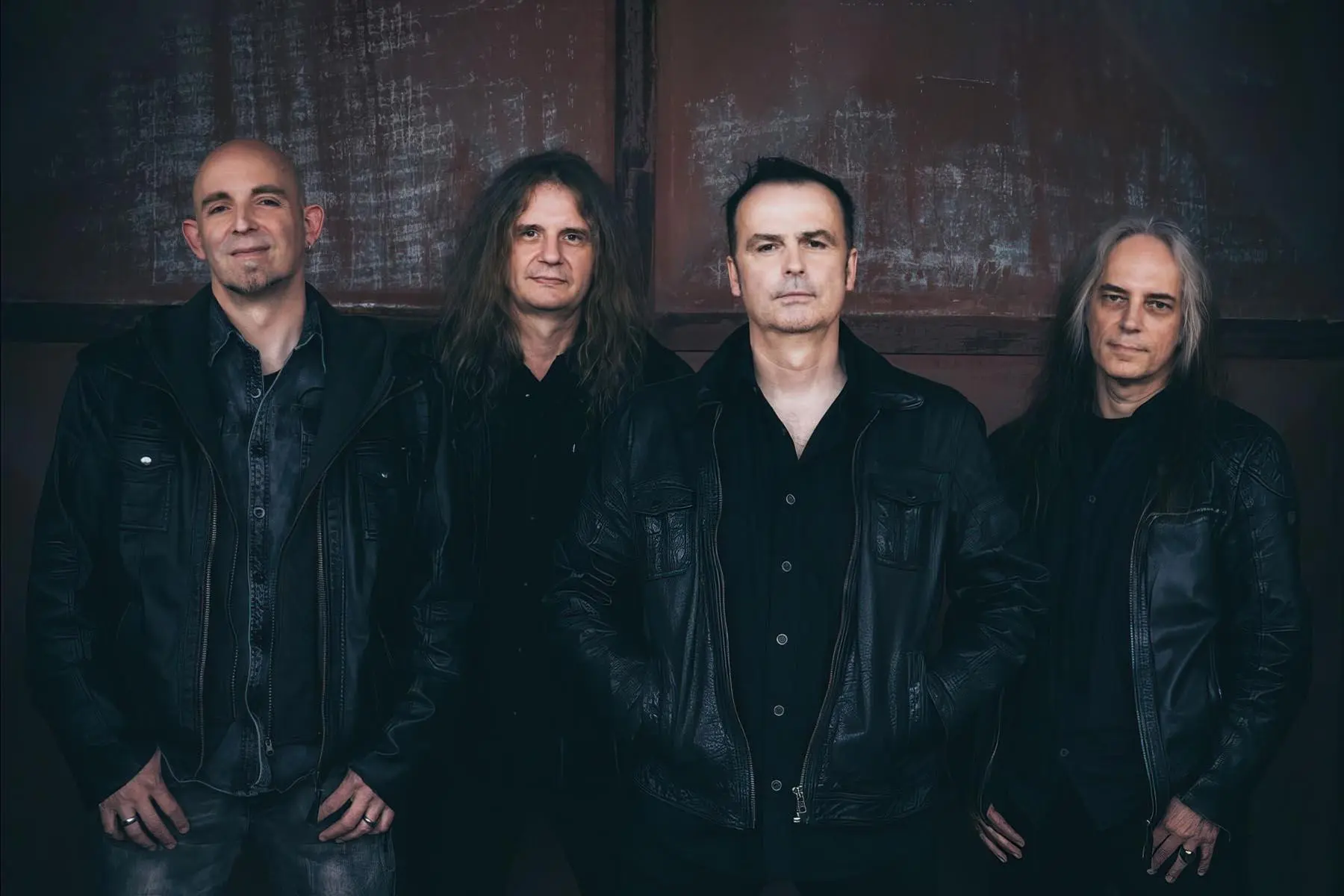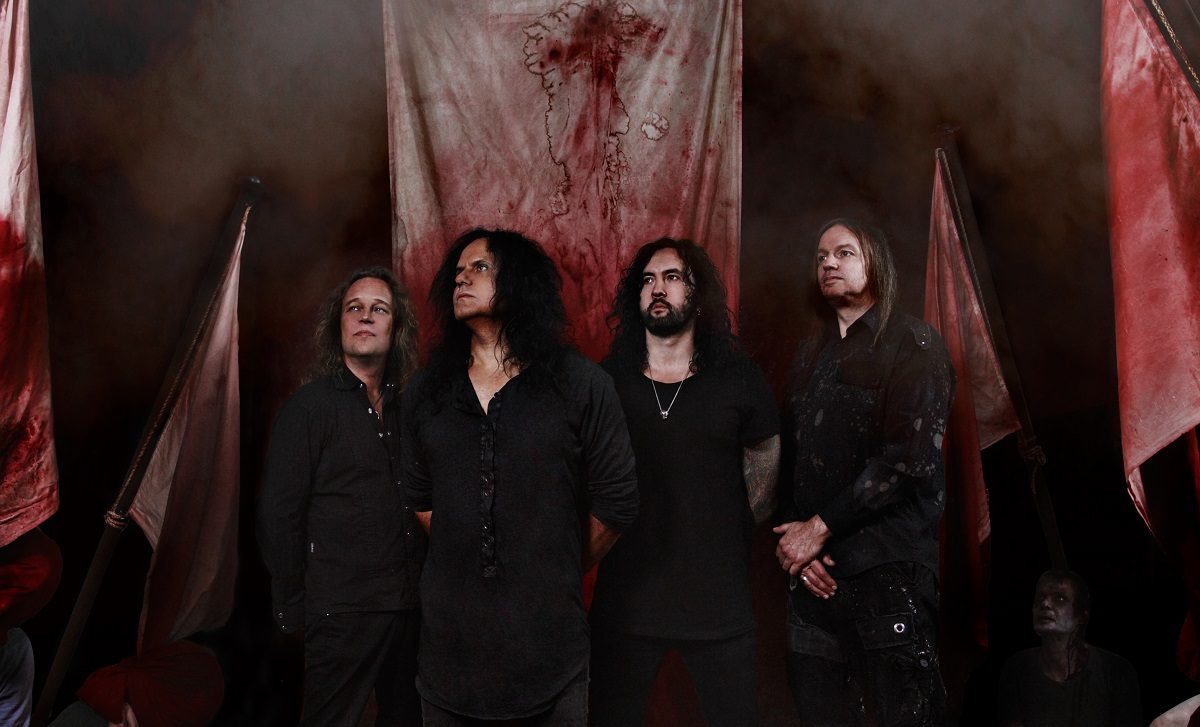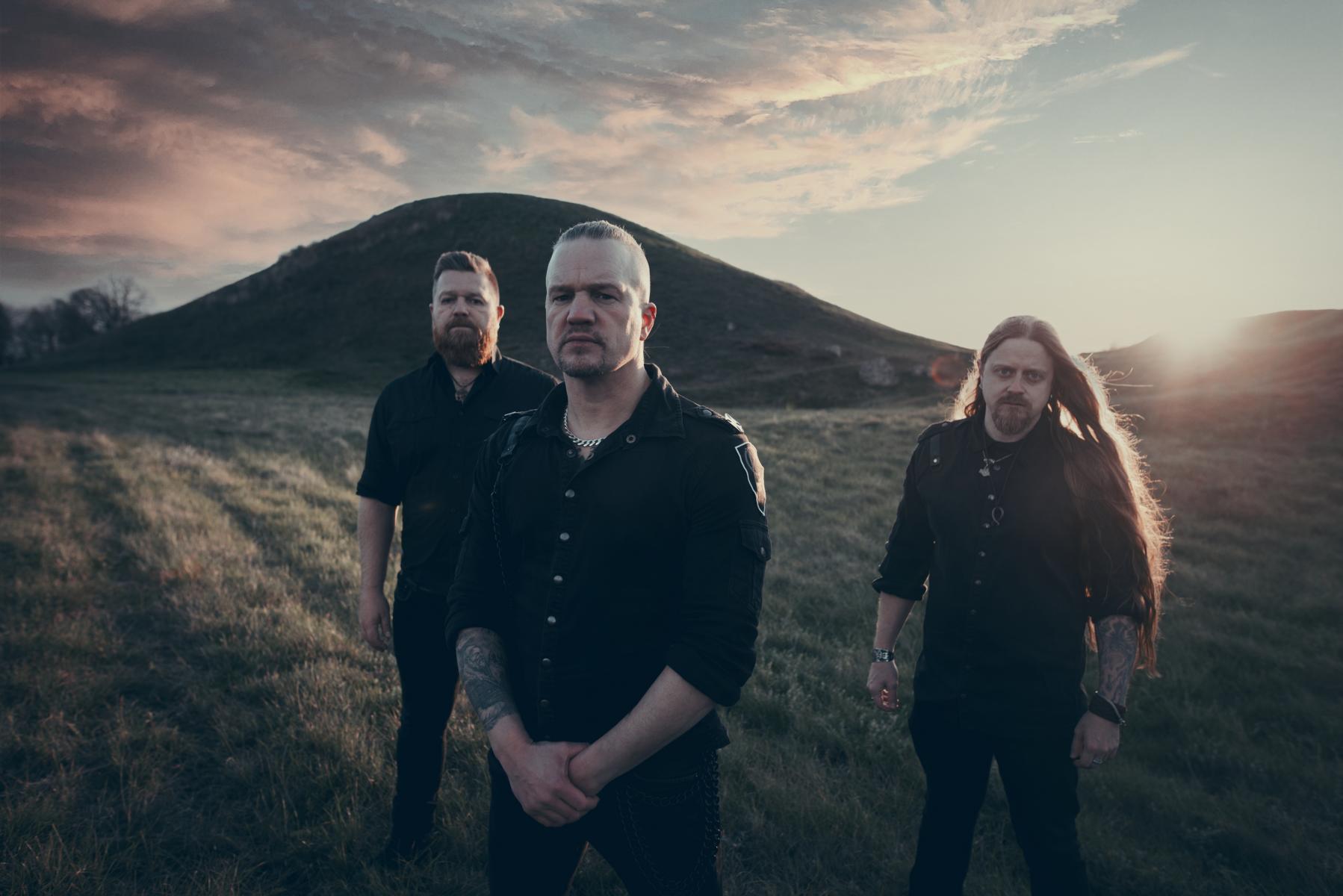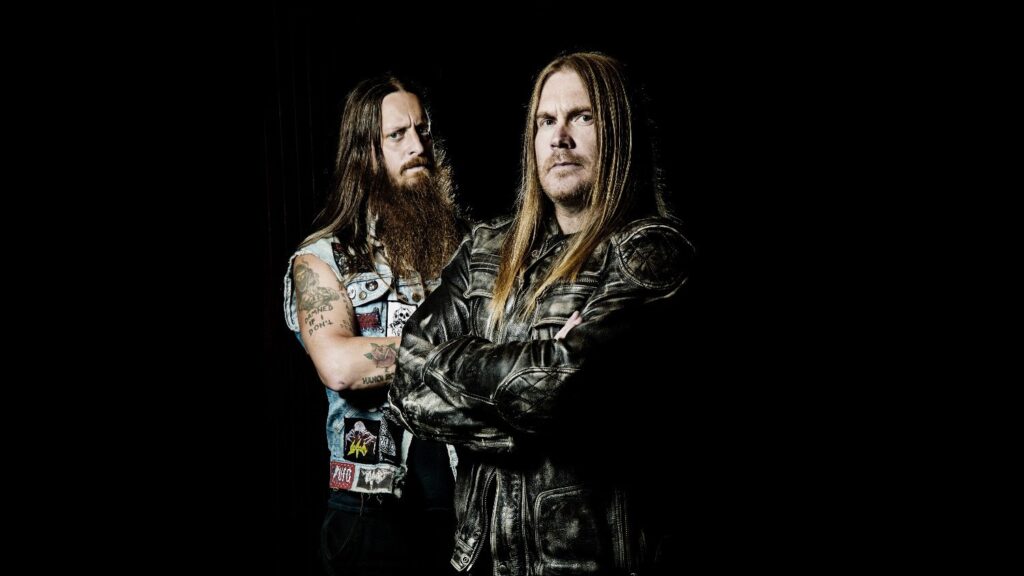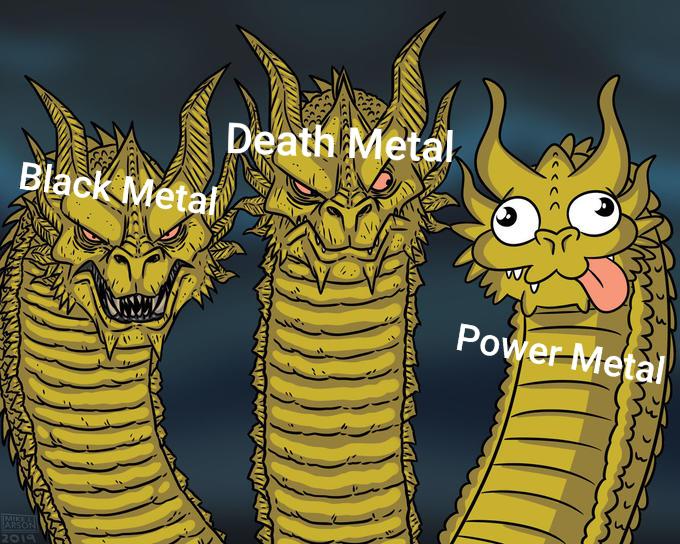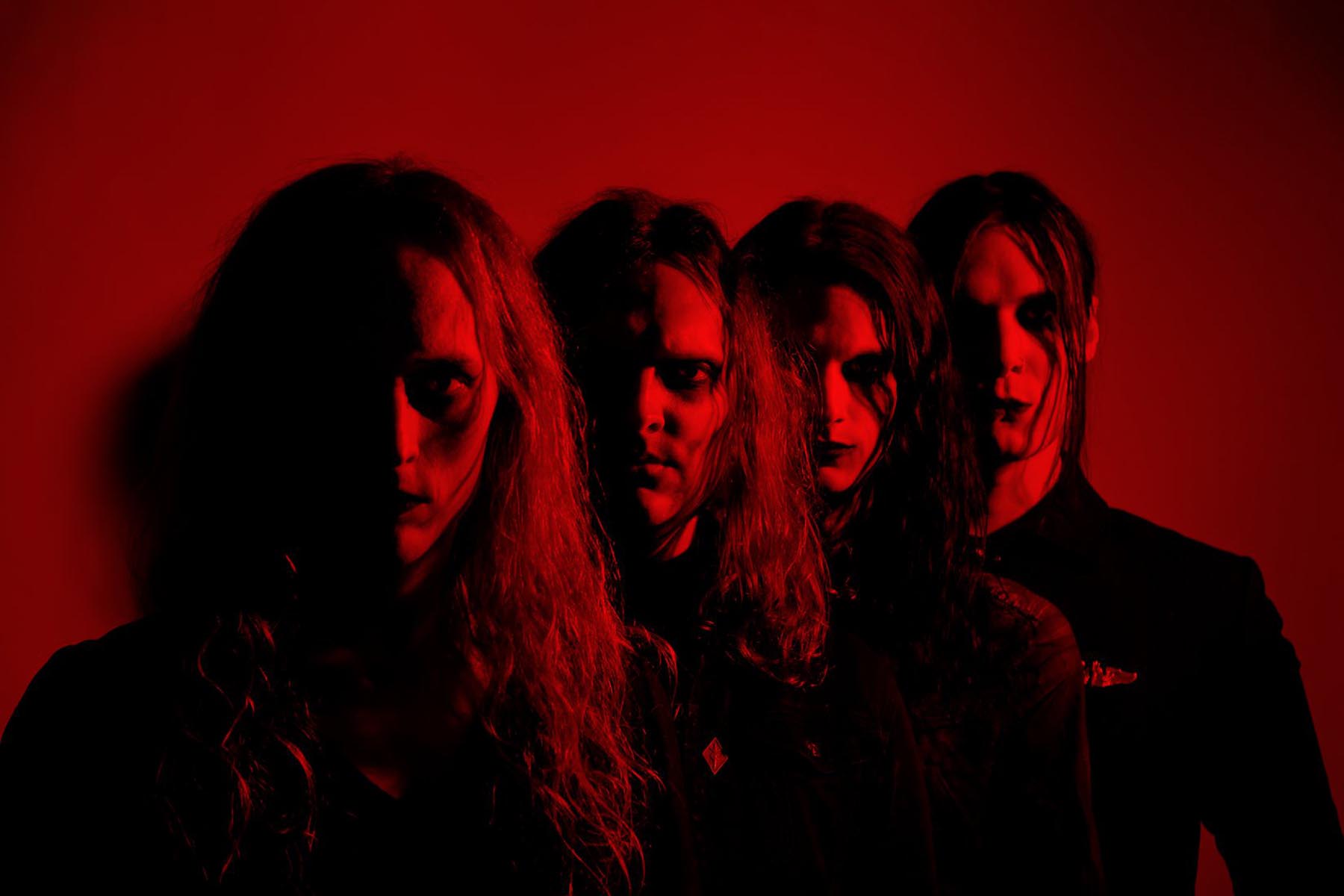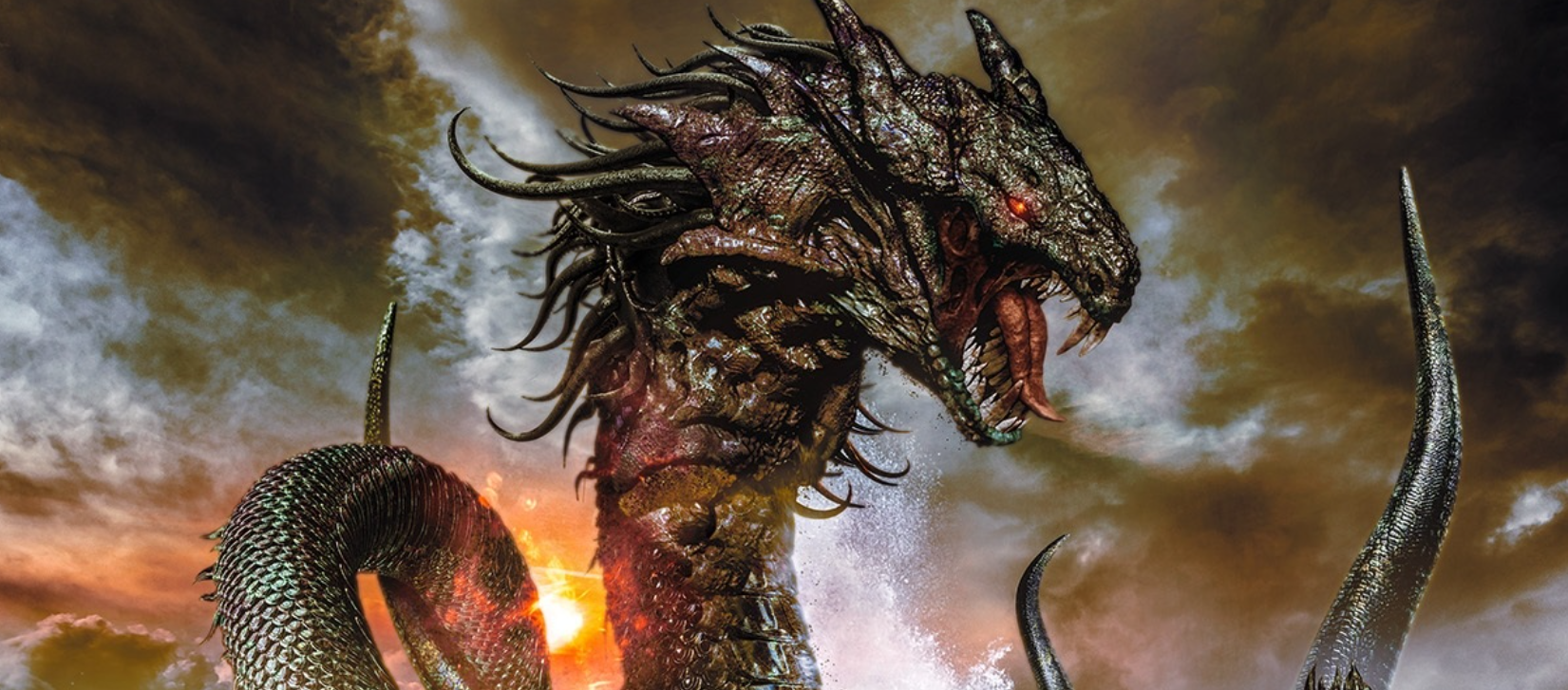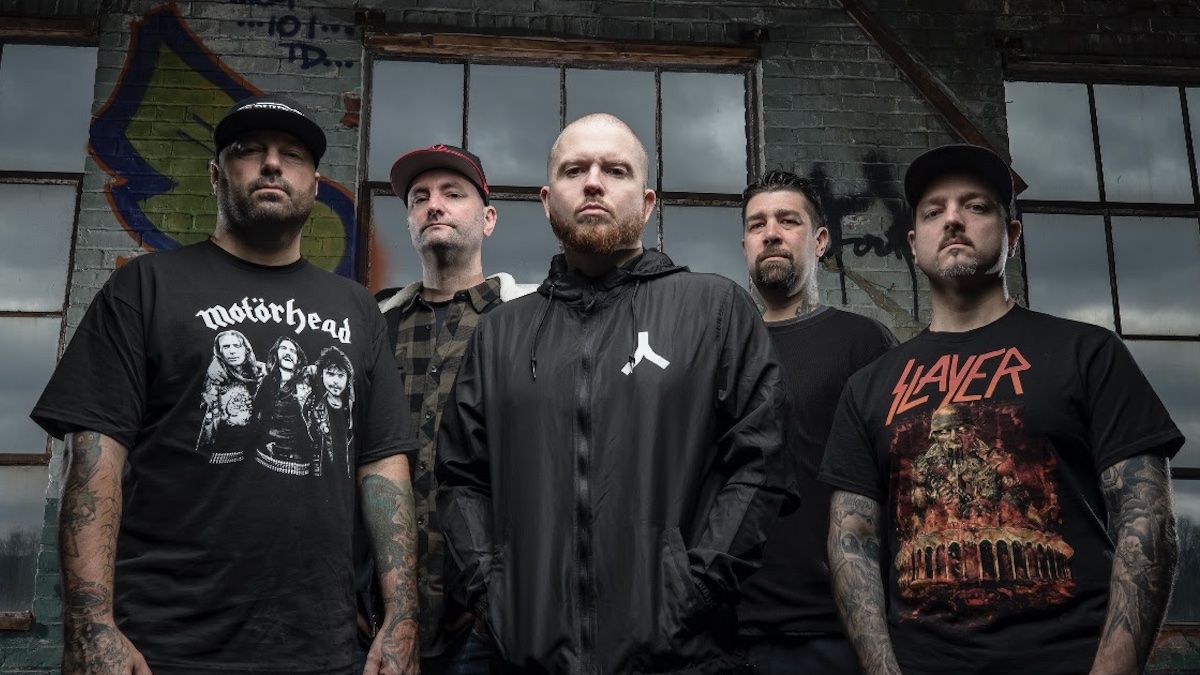The new releases have been piling up for the past couple months, and of course I’ve fallen behind. Hence ye old reviews codex, that possibly multi-part broad collection of reviews that span many months (some of these albums go back to mid-summer). In keeping true to my recent ethos not to force feed album listens when I’m not feeling it at the moment, some of these were things I had kept on the back burner until the moment arose to deep dive in again, and it’s an approach that works well for me, if not for metal PR agents promotional schedules. There’s likely going to be another one of these before year’s end because the calendar is still packed and I haven’t even yet discussed new albums by Queensryche and The Cult, speaking of which, I got to see them live again for the first time in over a decade the other week. That was a great show, a setlist full of classics, the band was incredibly tight and Ian Astbury sounded as great as ever. They’ve added a keyboardist/backing vocalist who really makes a difference in filling out their sound as a live band, giving Ian some extra melodic thrust on those hooks and filling in the extra vocal arrangements that were always missing when Ian had to do it solo. It was also my first time seeing a gig from the near stage vantagepoint of a VIP table, which a friend had decided to spring for. More than just the option of having a seat whenever I wanted, it was nice to have barriers preventing sweaty dudes from standing uncomfortably close to me, certainly the comfiest concert experience I’ve ever had. I don’t expect to make a habit of it though — comfort does not come cheap.
Megadeth – The Sick, The Dying… And the Dead!:

It hadn’t dawned on me until the release of this, Megadeth’s sixteenth studio album, that this had been the longest gap in between album releases for Mustaine, even counting that weird period in 2002 where he left his own band, only to regroup two years later with a Megadeth-labeled solo record of sorts in The System Has Failed (I mean… it was certainly more of a Megadeth sounding album than the turgid The World Needs A Hero). Such a long layover (pandemic assisted no doubt) had me nervous, thinking that their most recent superstar guitarist acquisition in Angra’s Kiko Loureiro might decide to bail given all the inactivity and instability (Mustaine’s cancer treatment delaying things, David Ellefson’s whole “situation”), but it’s nice to see him sticking around for a second album with the band because I thought he really lit a fire under Mustaine on Dystopia, which was a legitimately damn good Megadeth record. The classic leaning titling of The Sick, The Dying… And the Dead! conjures up memories of the band’s more teeth bared, snarky, aggressive attitude laden eras from the mid 80s through Countdown to Extinction, and there is so much of this album that actually does live up to that billing. The opening title track for example is as poison mouthed as you’d want it to be, Mustaine’s inimitable vocal necromancy at work in satisfyingly resilient fashion.
The absolute banger here is the classic “Life In Hell”, as vicious and fierce as so many Megadeth gems of yore (think “99 Ways To Die”, “Sweating Bullets”), not only for its cracking riff that is vintage Deth, but also for some of Mustaine’s most pointedly sharp lyrics in ages: “A couple drinks and then you’ll feel ok / A couple pills makes the world go away / What the hell, you’re gonna die anyway and you’ll say…”. Mustaine’s gift as a lyricist was never about poetic beauty, it was in his blunt sardonic wrath, and his depiction of self-destructive apathy here avoids being heavy handed (they did that on Cryptic Writings already, which I loved but it wasn’t vintage Mustaine), favoring a self-deprecating levity that just hits harder. The chorus here finishes the sentiment perfectly: “I’m a disease, and I’m addicted to myself, ha! / I’m all I need, I’m gonna live and die in hell”. It makes me cackle in delight every time I hear it. Like many, I also feel that “Night Stalkers” would’ve been a gem were it not for the Ice-T spoken word narration bit in the middle… that was just unnecessary. But there’s so much to celebrate here: the brutal assault of “Dogs of Chernobyl”, “We’ll Be Back” with its crazy lead pyrotechnics (Kiko is spectacular throughout this album), and the unpredictable dizzying turns of “Sacrifice”. I also really loved the Sammy Hagar cover of “This Planet’s On Fire” (featuring the Red Rocker himself), one of those classics that actually sounds better through the Deth filter and rings truer today. Not everything works here, there’s a little too much narration in parts, but this is a satisfyingly strong Megadeth record.
Aeternam – Heir of the Rising Sun:

Talk about a complete surprise, I didn’t see Aeternam listed on any of my upcoming albums lists and so didn’t even realize this was out until an hour before it dropped on midnight of September 2nd, and amidst all the Blind Guardian day excitement it got pushed to the backburner for a day while I went ham listening to the bards new one. Quietly, Aeternam have been putting together one of the strongest discographies of any melodic death metal outfit anywhere, with their four prior albums all being incredibly good to great depending on what you valued the most about their sound. For me, the band is at it’s best when they hit that perfect balance between their folk metal (as in Orphaned Land-esque Arabic/Middle-Eastern motifs) and melodic death sides, blending the two together seamlessly. The success of which varies from song to song on those previous albums but man when they got it right, they just owned that sound entirely. Well, somewhere along the way, vocalist/guitarist Achraf Loudiy must have realized that he could make both of these elements gel far more effortlessly if he just amped up the symphonic metal aspect of the band’s sound. It was always there in the background, a sort of connective keyboard glue that helped everything meld together, but it’s by far the most noticeable shift on Heir of the Rising Sun.
And cat out of the bag, this has become my favorite Aeternam album as a whole to date, a conclusion I’m able to confidently arrive at mere days after it’s release. Developing into a nigh fully symphonic melodic death metal band here (something they hinted at on 2020’s Al Qassam) has afforded their songs the lush cinematic grandeur they’ve yearned to illustrate on prior albums, and allowed their heaviness to increase to Moongod levels as a result in order to offset all that melody. Perfect examples of this are the brilliant “Beneath the Nightfall” with its blackened thrash riff sequences, and the glorious “Irene” with its orchestral swells that unfold into beautiful Arabic folk guitar patterns. My personal favorite is the masterful “The Treacherous Hunt”, a knife’s edge balancing act between their extreme heaviness and soaring, transcendently epic melodies that combine in perhaps the best song of their career so far. A monumental album that hopefully won’t get lost amidst all the other big releases that came out that day.
The Halo Effect – Days of the Lost:

This was one of my most anticipated albums for 2022 ever since I had heard about these guys getting together. The guys in question are veterans of prior In Flames lineups including Jesper Stromblad and Niclas Engelin on guitars, Peter Iwers handling bass, Daniel Svensson picking up the sticks again, and Dark Tranquility’s Mikael Stanne on vocals (remember he was on Lunar Strain/Subterranean). This is clearly one of those projects where the names on paper just created it’s own gravity with the weight of expectations that any resulting album might not be able to escape, an entirely different set of expectations from fans than the guys themselves had. According to recent interviews with Stromblad and Engelin, it was a project that came about simply because as old friends they felt the urge to just hang out and play music together again. And to that point, some of these guys like Svensson had sworn off being in bands entirely, retiring as professional musicians and doing other things, heck last I heard Iwers was co-running that In Flames owned restaurant/bar (dunno if that’s still happening). Thus, in reality, these guys were going to naturally pick up where they left off, even if that wasn’t a conscious decision to do so or not —- meanwhile I suspect a large chunk of fans (myself included) expected a deliberate move towards recreating the classic mid-late 90s Gothenburg sound that we all love and crave a return to.
Long story short, that didn’t happen on Days of the Lost, which doesn’t mean its not a good album, because it certainly is. It is however a modern, fairly restrained take on melodic death metal ala recent Dark Tranquility (Stanne’s vocal choices certainly exacerbate that influence greatly). The frustrating thing that many have voiced about this record that I agree with are all the tiny Jesper-isms that get interjected throughout, like the darkly beautiful acoustic outro to “A Truth Worth Lying For “, the lead guitars on the very In Flames-ian “Gateways” (the album’s most old school moment happens during the abrupt mid-song shift lead riff progression), or the entirety of “Conditional”, easily the most classic and aggressive song on the album (see how those two things seem to go hand in hand?). At worst this album fades into the background where you don’t notice songs passing by, at it’s best it makes you long for what could have been. I hope they do another to deliver on that promised potential.
Brymir – Voices in the Sky:
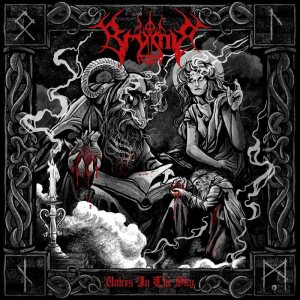
Since their 2011 inception, Helsinki’s Brymir have been one of the most promising bands to come out of Finland, and indeed the wider symphonic metal scene worldwide. Crafting a fusion of symphonic blackened folk metal with bright, inspired power metal melodicism, they’ve finally to my ears fulfilled their potential with their newest effort, Voices in the Sky. And that’s not to suggest that I wasn’t impressed with 2019’s much lauded Wings of Fire, but I didn’t think it was the masterpiece I saw some people tagging it as. It suffered from getting a little too monotonous at points, the band leaning too hard on the symphonic black side of things and going break neck speed for most of that album. On the new album, they’ve allowed their sound to shift gears often with dynamic song structures, infusing more clean vocals (the epic, chanty, choral Ensiferum kind) and power metal elements into the mix to temper out their extreme side and let those heavier moments land more forceful impacts as a result.
As so often with bands who do fusions of two disparate or even complementary styles of metal, they often find themselves crafting their best songs when they’ve worked out how to best balance the various musical elements in their arsenal. The best moments here are perfect examples of that, the heavenly wash of choirs that usher along the title track for starters, and the outright aggressive slabs of unmelodic riffs that serve as battering rams throughout “Forged In War” that standout as inverse breathers from the richly melodic refrains. The best moments however are where Brymir ascend to the heavens, as on the folky, adrenaline rocketing “Fly With Me”, with its ascending hook sequence, and gorgeous, Dragonforce-esque guitar solos. My personal favorite here is “Herald of Aegir”, an emotional rush that recalls vintage Ensiferum/Wintersun, with an achingly emotional clean vocal passage that is as sweeping as the brilliant lead guitars that it skates atop. This album is a joy to experience, easily Brymir’s most accomplished and fully realized work to date.
Dynazty – Final Advent:

Slowly but surely, Dynazty have developed into one of the most reliable leading lights of the modern AOR movement. Of course, its a bit of a misnomer to classify them as such entirely, because there is a strong dose of power metal grandeur and theatricality to their sound, but the blending of these two styles put through a modern, Jacob Hansen produced filter has been their sound for these most recent two albums. It’s essentially a distillation of what they were attempting on previous albums but sanded off of some of the rough edges — which usually might be interpreted as a negative thing so I’ll stress that I don’t think that’s entirely the case here. I call them reliable because I can’t recall having heard a bad, awkward, or otherwise embarrassing song on this or their past few albums — things are pretty solid for the most part with one or two songs even standing out as notable highlights worth playlisting. I’d say the trouble with Dynazty is that it gets really hard to build a passionate following when you’re only delivering solid albums and never a truly great one.
The songs on Final Advent that I’d say qualify as aforementioned highlights include the power ballad (of course) “Yours”, a cousin of “Hologram” from 2020’s The Dark Delight, all anguished melodrama and a guitar solo midway through that’s phrasing is shatteringly emotional. There’s also a racing urgency to “All the Devils Are Here” that is vintage Dynazty in the best way, and I love the unorthodox, almost folky tinge to the lead guitar melodies in “The White” that gives it a different flavor from the rest of the album (Rob Love Magnusson and Mike Lavér are a talented guitar duo, and I wish they’d open up their palette with stuff like this more often). Vocalist Nils Molin (also of Amaranthe co-vocalist notoriety) of course sounds excellent throughout, his voice full of power and rugged inflection, though some might find his approach a little too heavy handed (and perhaps the band and he could both use a little loosening up, perhaps a rock n’ roll injection?). You’ll notice I haven’t really said anything specifically critical here, because there’s nothing to harp on to be honest. It’s a solid Dynazty album, albeit not a great one, and maybe that’s the larger criticism I’m edging around here, that I don’t exactly know what a truly great Dynazty album would sound like and that might be a bigger problem in the long run.
Xaon – The Lethean:

You always know a band is flying under the radar when they have zero reviews on their newest album on Metallum. Switzerland’s symphonic progressive death metallers Xaon released The Lethean back on July 1st and have yet to acquire a single review of not only their newest effort, but the two that have preceded it. And fair enough to everyone out there, because I myself didn’t know who this band was until my cohost Cary played the stellar, maybe best song of the year “If I Had Wings” on a recent MSRcast episode. My attention was immediately grabbed by that song, but you know how it is, I lollygagged a bit in terms of checking out the entire album for a few weeks. But the pull of that aforementioned song was too strong to resist for long, and I checked out the rest of the album in turn and wow… this is something special. Xaon get tagged as symphonic metal on Metallum, but I threw in the progressive tag above because there’s an unorthodox approach to the way these guys approach arrangements and songwriting structures in general, often eschewing traditional verse to prechorus to chorus sequences. Instead, as on the opener “The Hunt”, they utilize an almost metal equivalent to “movements” in ushering their songs along, where perhaps the rhythmic assault stays constant, but melodies abruptly shift and mutate along. The secret to Xaon’s success here is that each successive movement only escalates the dramatics at work within these rushing melodies via guitars or keyboard drive symphonics.
And then there’s the matter of their overall sound being different from what you’d expect from a band tagged as merely symphonic death — vocalist Rob Carson can run the gamut from guttural to melodeath screaming, but he mostly favors his clean vocals which are often anguished and twisted like Primodial’s Alan Averill, but at times soaring and downright gorgeous like a darker toned, more gravely Nick Holmes. I have to speak about “If I Had Wings” here briefly, because I’m sure I’ll be talking about it a few months from now as well: This is such an epic song (we overuse that term but it applies here), the kind of glorious, passion driven burst of creativity that few bands ever manage to unearth, and I am still enthralled by it after playing it repeatedly over the past few weeks. Carson is magnificent here, and if there’s one song you decide to check out first from this beast of an album, make it this one (it helps that it’s the single, wisely chosen guys). Ten tracks, no fillers, real creativity at work here, genuine conviction in the performances, and multifaceted in their abilities (check out “Telos” for their more reflective, Opeth-ian acoustic side that is actually affecting), Xaon is one of the year’s most satisfying discoveries for me.
Heilung – Drif:

If you’re even passingly aware of the cornucopia of reactor channels on YouTube, you’ll know that a live performance by the esoteric folk outfit Heilung has gone kinda viral in terms of being a popular reaction choice amongst that set. And its mostly for the members very primal, tribal garb laden appearance onstage and the fact that they’re playing unorthodox instruments and singing in styles that defy modern stylings. On their Wikipedia page, their project is self-described as “amplified history from early medieval northern Europe”, which is fairly accurate according to what I’ve heard (who knows, has an anthropologist verified that? Does it really matter anyway?). I’ll admit that at first I just felt a passing fascination with Heilung, simply because it was attracting so much reactor interest that and kind of prevented me from wanting to dive in further, feeling like it was something that might have been borderline gimmicky. I realize now that was a silly attitude to have, because having decided to check out their newest album Drif just as a pure audio experience (meaning I didn’t seek out the videos), I’ve really come to appreciate this album as a palette cleansing come down after listening to a lot of metal that’s still complex and thought provoking on its own merits.
Now I will clarify, that’s not including all of the album, because I could’ve done without the loud, irritating Stomp the Musical sounds in “Urbani” and the spoken word insanity of “Keltentrauer”. The stuff that I lean towards on this album is “Anoana” which reminds me of a darker, more medieval sounding mix of Loreena McKennitt, Enya, and Dead Can Dance (not quite so, but as a point of reference that’s the best I can do). I also loved the brightness of “Nikkal”, where choral vocals took center stage singing a melody that sounds elegiac, wistful, and unlike anything I’ve ever heard before. You’re probably getting the picture by now that none of this is metal, but Heilung are so folk metal adjacent, that even in the absence of heavy guitars or distortion of any kind really, you should still feel drawn to this as a metal fan. And look they threw a bone for you and named the last song “Marduk”, and to be honest, its echoing bells and whispered poetry I’d contend are more unnerving than anything put out by the band of the same name in ages. That’s not a shots fired thing by the way, it really sounds creepy as hell.
Sumerlands – Dreamkiller:

Hailing out of Philadelphia, Sumerlands had previously made a splash with their self-titled debut way back in 2016 with then vocalist Phil Swanson. It was an inspired eight song collection of traditional metal in the early to mid 80s mode, suitably rockin’ songs with inspired performances that seemed to be taking pages from several influences. The seeds were there for something really great to emerge, but as is the case with newer bands, sometimes it’s hard to capitalize on momentum and get a new record out quickly when stability is an issue. A vocalist change is a major thing, so is a worldwide pandemic, so here we are about six years later with Dreamkiller, their sophomore album and first with new vocalist Brendan Radigan. I was already pretty fired up about this one, having gotten to see Sumerlands live at Hells Heroes in April of 2022 where they laid on a spectacular set, Radigan every bit the inspired frontman in a live setting. Among others, it was a definite highlight of that evening, and taking that experience into account and now hearing Dreamkiller, Radigan really does fit the band better than Phil Swanson did. His vocals are like a mix of early 80s Ozzy and Klaus Meine with a the smoothness of Don Dokken, a tone that’s rich in expressiveness and commanding in every utterance. His approach lends a sense of comfort to the overall sound, rooting this in territory that feels familiar and even nostalgic even though these songs feel fresh and modern.
And the songwriting is the star here, Sumerlands guitarists Arthur Rizk and John Powers crafting riffs that are groove based, ultra hooky and incredibly satisfying with tight leads to punctuate them. The one two punch on this record sits in the middle of the tracklisting, with “Edge of the Knife” and “Force of a Storm” landing with the kind of infectious kinetic energy that characterized classics such as Dokken’s “Into the Fire” or WASP’s “Wild Child”. The former is one of the most infectious songs I’ve heard this year, a driving old-school rocker with a massive riff based hook and Radigan nailing the vocal line with emphatic gusto. I love the effects on those vocal harmonies laid over the top, it really harkens back to productions choices in the mid-80s that characterized a lot of those great records. Stepping on the gas a bit, “Force of a Storm” has a desperate urgency to its restless riffs and I love the keyed in explosion sounds in those transition moments — the kind of thing that would be utterly ridiculous if not applied exactingly. And that kind of sums up Sumerlands overall approach here, because their nods to their 80s trad metal influences are so overt yet applied so delicately, so natural sounding in their own idiom that they don’t end up sounding like anyone but themselves.
Blackbraid – Blackbraid I:

About a few years ago, pandemic starting time I guess, I started following a guy on Instagram who was making really cool bone art. You can Google that if you’re drawing a blank right now but I imagine most of you know what it is. Anyway so in addition to his art he’d post up pictures of himself around the area he was living, a rural seeming landscape, so I knew that he was of Native American heritage from not only appearance, but from the meaning of his artwork as well. Jump forward to my hearing about an awesome record from a new project called Blackbraid, imagine my surprise when I checked out their biography and realized it was masterminded by indeed the very same bone art guy I had been following for years on Instagram. His name is Sgah’gahsowáh (also goes by Jon) and in true one man black metal project fashion, he is credited for “everything” on this record (although drums are provided by the album’s recording engineer (and man of many bands) Neil Schneider. To be honest, it had never crossed my mind that black metal would seem to fit black metal so well, but Blackbraid I makes it seem like it was always a merging that was meant to be.
No burying the lede here, this is one of if not the most accomplished black metal releases I’ve heard this year. It hits the target of what I value the most in modern black metal productions, that being clarity in the mix in terms of instrumentation separation and discernible melodies, but also in avoiding sounding clinical. This album, despite all the razor sharp tremolo riffs, is streaked with a subtle earthen warmth that underscores much of its quick thirty-six minute run time. Its not just in those Native American folk music soaked instrumental tracks either, but in the way the melodies are unfolded in the blistering, full speed ahead black metal here. On my favorite cut “Sacandaga”, there’s a dynamic shift between tempered, deliberately paced sequences and sudden bursts of hyperkinetic speed, the effect being violent and uncontrollable. The aforementioned folk music pieces it should be pointed out aren’t just window dressing — being two of the six tracks here they factor into the album in a big way. I’d argue they give the entire record its spiritual or emotional center, setting the listener down in a headspace meant to reflect the lyrical settings explored here, of creeks, pastel skies, and hemlock forests. As imagery goes, its a refreshing difference to behold from tales of ice covered Norwegian mountains and permafrost, this being a truly Native American black metal perspective. I really love this record.
Seventh Wonder – The Testament:

I don’t know why I’ve had a hard time settling down to give this new (ish… it came out in June) Seventh Wonder album the time and attention it deserves. I’d listened to it intermittently over the past few months but only recently decided to buckle down and give it my undivided attention. And now that I have, I’ve come to realize what was perhaps preventing me from achieving this all these past few months gone, namely, that this album gets me restless partway through. I suspect this is largely due to the pervasive sameness that seems to be running through the length of this thing. Unlike older Seventh Wonder classics like Mercy Falls or the really wild The Great Escape, where song diversity was an integral part of the final tracklist, it feels like songs on this (and to a certain extent their 2018 album Tiara) really sound similar in their style, tempo and overall approach. Despite the band’s technical prowess leaning towards a breezier Dream Theater, their songs are written to be geared around Tommy Karevik’s vocal melodies almost exclusively. And this works for a while, certainly on these first three songs that shotgun the start of the album in the single-ready “Warriors”, the uptempo, almost dance-rock strut of “The Light”, and the Empire-era Queensryche invoking semi-ballad “I Carry the Blame”. The latter is certainly one of the best individual slices of hook laden prog-rock the band have dished up, making up in what it lacks in heaviness with layers of gorgeously honeyed vocals from Karevik.
But after the patience testing instrumental “Reflections” is followed by the grating “The Red River” (usually where I’ve checked out on past listens), it’s hard to keep focus on the rest of this record. I actually enjoy some parts of “Invincible”, mainly the hook factor in the chorus here, but man for a three and a half minute long song there are stretches here that I wish would hurry up and be done every time I play it. And I like the increase in aggression via the guitars in “Under a Clear Blue Sky” but they’re unfortunately lost in a song that is way too long with very little in the way of discernible connective tissue (ie melodies that I want to return to). The closer “Elegy” is certainly pretty in the moment, though it’s not something that I could see myself returning to on it’s own. I do feel that maybe I’m being too hard on this album, but in fairness to myself, I have given it the benefit of many months to land, and it just hasn’t quite gotten there. Still a good band, and I’m glad it’s an ongoing concern for Karevik given his Kamelot day job, but they’re not delivering in quite the same way they used to for me.
Oceans of Slumber – Starlight and Ash:

I think there was always a part of me that felt Oceans of Slumber was meant to head down this path, that being the gradual and now sudden removal of harsh vocals from their repertoire. The moments that excited me the most from their past few albums were those where vocalist Cammie Gilbert got to simply steer the ship with her distinctive, richly emotive singing instead of playing point/counterpoint. Its not that the band didn’t deliver good material with their more extreme metal rooted stuff, its just that the alternative they were offering in small handfuls was so much more enticing. I’ve said this over and over again here and on the podcast already, but my favorite Oceans of Slumber moment has been the title track to The Banished Heart, particularly during its midsong bridge onwards, that finale passage has all the dramatic sweep and grandeur that seemed like a sound world they should be exploring more of. Here on Starlight And Ash, they’ve finally decided to do just that, terming their sound as southern gothic which is exactly the descriptor I’d have tagged that aforementioned epic section of “The Banished Heart” with had I thought of it first. I think I’ve been rather critical of this band throughout their past few albums, but I’m happy to say that it was really hard to find something to complain about here. Simply put, this is the album I’ve been waiting for Oceans of Slumber to make, one that genuinely feels as though they’ve discovered their own voice, they sound more comfortable here than they ever have, some of these songs sounding as though they were effortlessly written.
I’m thinking here of “The Hanging Tree”, where Gilbert channels a little mid-90s Natalie Merchant in her vocal tone over twangy guitars and a generous amount of space and silence. These songs are shorter than older Oceans, with no more progressive death metal on the agenda, gone are the six to seven minute run times, Gilbert having free reign to work in the context of more manageable, focused three to five minute pieces. The absolute gem here is the opener “The Waters Rising”, with it’s beautiful country-folk tinged acoustic guitars, throbbing electronic pulse underneath, and moody piano melody running through. Somehow this album hits heavier than any of their others, despite the general lack of aggressive riffs and metallic elements — it brings to mind Smashing Pumpkins Adore, both tonally and lyrically, a softer, more hushed album that was an absolute emotional wrecking ball. I love that they found a sound that feels very authentic to who and where they are as well. Southern gothic indeed. I’d always associated that term with Anne Rice’s vision of New Orleans, but in this album I can really feel how Houston fits into the mix, the smell of asphalt and car exhaust, the blanketing heat and restless humid nights. Oceans of Slumber have found their identity with Starlight and Ash.
Fallen Sanctuary – Terranova:

So Fallen Sanctuary is a side project involving Georg Neuhauser (Serenity / Warkings) and Temperance guitarist-vocalist-songwriter Marco Pastorino who I’ve long considered one of the better songwriters in the melodic power metal world over the past few years. Georg himself is no slouch in that department, capable of crafting vocal melodies that are hooky, memorable, and earwormy for whatever project he’s involved in — the Tony Kakko meets Klaus Meine vocal tone is also a strength. So on paper this was an intriguing pairing to consider, and I actually broke my tendency to not listen to the singles ahead of time for this album because I was so curious. The album itself got shafted for listening time when it came out due to other things crowding the schedule so I know this write up is really late, but I’ve been re-listening to it over the last week and kinda glad I did because I think at first I glossed over how well crafted this ended up being. I respect that they didn’t try to veer outside of their comfort zone, which might be a weird compliment, but leaning into one’s strengths isn’t a bad thing really, hence these songs being vocal melody driven affairs. The riffs aren’t particularly aggressive, instead settling in a muted, crunchy tone fitting for this approach to melodic power metal where they’re not the main attraction anyway.
On strong cuts such as “Broken Dreams” and the lead off cut “Terranova”, the mood is light, uplifting, and almost sunny, the former even giving us a little a cappella vocal intro that veers into AOR territory. A little darker is “Now and Forever”, a song that reminds me of something off Serenity’s Codex Atlanticus, a song that goes through a couple transitions with different hook laden elements to each (the mid song bridge has a terrific vocal melody by Neuhauser). For his part, Pastorini can be heard on backing vocals throughout, and he sounds great, but he mostly cedes the leads to Neuhauser. An exception might be the pretty but sparse acoustic ballad “I Can’t Stay”, where you can hear him chime through on the chorus and the contrast between the two men’s voices is distinct and vibrant in their differences. This is definitely an album meant for those who would dig this kind of thing on paper, it won’t change any minds in that regard, but I dig what these two guys do in general (Warkings excepted) and this is something I’ll probably return to when I need something AOR/power adjacent that’s a little chilled out.


